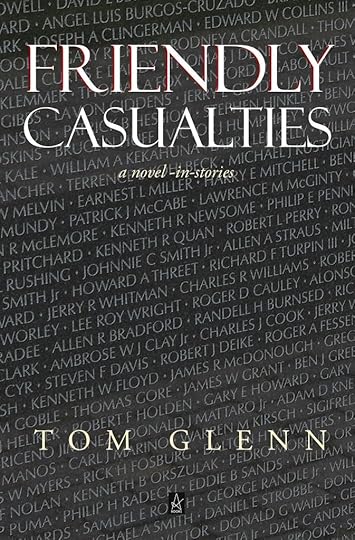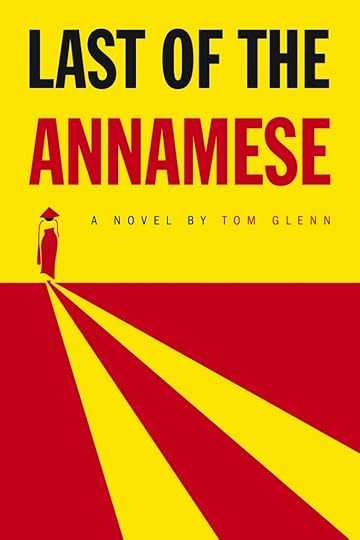Tom Glenn's Blog, page 25
September 26, 2022
The Trion Syndrome
The next book to be considered is in some ways the darkest. Because of the time I spent on the battlefield in Vietnam and elsewhere in the years following the fall of Saigon, I suffer from Post-Traumatic Stress Injury (PTSI), a mental disorder that results from experiences so harrowing that they damage the soul. I endure PTSI because of the unspeakable things I observed and participated in during combat. Because I had top-secret-codeword-plus security clearances, I was not permitted to go for therapy to help me cope. I had to do it on my own. I learned early on that I had to bring the unbearable memories into my conscious mind and train myself to react more calmly. The best way for me to force myself to face the memories was to write them down. That led to my books about Vietnam, and especially to The Trion Syndrome.

Trion is about a Vietnam vet, Dave Bell, suffering from PTSI and how it very nearly destroys his life. It tells of his panic attacks, nightmares, flashbacks, and depression as he tries to recall something he knows resulted in death. When he finally does remember, he goes to pieces.
The rest of the book details his struggle to come to terms with his memories. He runs away to the country in Maine, becomes a bum, then attempts suicide. Then one day, someone new shows up at his door. His life is permanently changed.
September 25, 2022
Friendly Casualties
The second book of mine that I want to discuss is Friendly Casualties. I published it as an ebook in 2012 after I had tried repeatedly and unsuccessfully to find a publisher willing to bring it out in hardcopy. It’s the only book of its kind that I have ever come across: the first half is a series of short stories; second half is a novella that resolves the issues left incomplete in the stories.

The central concern in the book is, as in so much of my writing, the Vietnam war. I wanted to express my sense of loss that we were defeated in that war after so many I knew died trying to win it. I devoted my youth to Vietnam. I first arrived there in 1962 at age 26 and left for the last time at age 38 under fire when Saigon fell in 1975. During the intervening years, I spent more time in Vietnam than I did in the U.S. I had two accompanied tours there with my wife and four children—my kids still remember living there.
Friendly Casualties has a new life: Adelaide Books of New York will be publishing it in hardcopy sometime this year. The cover they chose for it is shown above. The background is a portion of the Vietnam Veterans Memorial in Washington, D.C., known to so many of us just as The Wall. It displays over 58,000 names of American servicemen who died in Vietnam. I am deeply moved and humbled.
September 24, 2022
Last of the Annamese
Since a flea market is coming up in which I’ll be hawking and autographing my books, I decided it would be a good idea to do a blog post on each of them. I start with Last of the Annamese.

The book has been awarded more prizes than any of my other books. It tells, in fictionalized form, the story of my escape under fire when Saigon fell to the North Vietnamese invaders on April 29, 1975. Another writer, Stephen Phillips, called the book a proverbial bookend companion to Graham Greene’s The Quiet American. Like all my books and stories, Annamese is fiction in name only—every event described really did happen.
The name of the book comes from an alternate name for Vietnam, An Nam. Many centuries ago, when the tribe that eventually became known as the Vietnamese resided in southern China, the Chinese derisively named them the yueh nán (越南)—which in the language that tribe spoke became Việt Nam. It means those who cross over to the south or the troublemakers in the south. Over the centuries, after the Vietnamese travelled south into what we now call Vietnam and established their own state, they went by many different names. One of those was “An Nam,” which means “peace in the south.”
One of the principal characters in the book, South Vietnamese Marine Colonel Thanh, doesn’t like being called a troublemaker in the south, so he uses the name An Nam for his country. A person from An Nam is called (in English) an Annamese. Hence the book’s title. Which of the book’s characters is the last Annamese is up to the reader to decide.
September 23, 2022
Flea Market
I’ll be selling and autographing my books at a flea market less than a mile from my house in early October. The Hickory Ridge Flea Market, open from nine to twelve on the morning of Saturday, October 8th, will give me the opportunity to offer my five (and maybe six, if the hardcopy version of my novel-in-short-stories, Friendly Casualties, is in print by then) books to the public.
My books, all fiction, are:
—Last of the Annamese, my best-known work, tells the story of the fall of Saigon as I lived it, escaping under fire after the North Vietnamese were already in the streets of the city.
—The Trion Syndrome, the story of a Vietnam vet suffering (as I do) from Post-Traumatic Stress Injury (PTSI) and how he copes.
—No Accounts, drawn from my years of caring for dying AIDS patients, tells the story of a straight man caring for a gay man dying of AIDS.
—Secretocracy, the tale, based on what actually happened to me, of the president of the U.S. lowing the boom on an intelligence budgeteer who refuses to fund an illegal operation.
—Coming to Terms, a collection of short stories about, as the Foreword says, “men and women confronted with pain as a consequence of love and hate, goodness and evil.”
—Friendly Casualties, whose first half is a collection of short stories with a second half a novella that tells the outcome of those tales.
Hope you can make it.
September 22, 2022
Vote for DeSantis (2)
Having overseen more covid-19 deaths in Florida than in any other state, DeSantis went on to outdo himself: he used over $600,000 in taxpayer dollars to lure 50 Venezuelan asylum seekers onto a flight to Martha’s Vineyard, Massachusetts, where he dumped them and left them without resources. That, in addition to being grossly immoral, may have been illegal.
Despite all that, DeSantis remains one of the most popular governors in America, according to a new poll conducted by Pulse Opinion Research for U.S. Term Limits. Statewide, 64 percent of Florida voters approve of the job DeSantis is doing, versus just 24 percent who disapprove. Support for DeSantis is broad across nearly all political and demographic groups.
I am forced to conclude that those who vote to keep DeSantis in power value conservative political values above the lives of their fellow citizens. I’m reminded of my questions about who could possibly vote for Donald Trump. Both DeSantis and Trump care greatly about retaining power and little about the welfare of citizens.
Who could possibly vote for such men?
September 21, 2022
Vote for DeSantis?
Watching what’s going on in Florida during the governorship of Ron DeSantis forces me to ask: who could vote for this man?
DeSantis’s record speaks for itself. Since the COVID-19 pandemic began in Florida, DeSantis has resisted imposing restrictions such as face mask mandates, stay-at-home orders, and vaccination requirements. In May 2021, he signed into law a bill that prohibited businesses, schools, cruise ships, and government entities from requiring proof of vaccination.
One result: by autumn 2021, Florida had had more deaths than any other state during the Delta variant spike, and altogether over 58,000 people in the state died from the virus.
Things got worse in 2022: by September, Florida had logged, for the third month in a row, more COVID-19 deaths than anywhere else in America. The U.S. Centers for Disease Control and Prevention reports that Florida’s COVID death toll grew by 1,614 people in August. Many, perhaps most, of these deaths could have been avoided by vaccines, face masks, and other precautions which DeSantis refused to approve.
More next time.
September 20, 2022
Democracy in Decline
I was shocked to read on the front page of the Washington Post of September 19 that a dozen Republican election candidates are refusing to say that they will accept the results of their contests. They may, in other words, reject the voters’ decision and maintain that they won the election, validated and verified vote counts notwithstanding. This is the latest damage to our democracy instigated by Donald Trump, who to this day claims that he didn’t lose the 2020 election. The evidence of his defeat is undeniable and overwhelming. What he is doing is, in effect, to contradict the will of people. And now other Republican candidates are joining him.
Refusal to accept the results of an election is the epitome of fascism. It means to claim the right to rule regardless of the will of the people. It’s Hitler and Mussolini reborn. The Republicans are saying they will rule us whether we want it or not.
It’s time for us to get out the vote and defeat these fascists.
September 19, 2022
GOP and Guns
I am continuously mystified by why Republicans oppose measures that would reduce gun deaths. Why do conservative beliefs affect how one feels about the gun death crisis in the U.S.?
And there is a crisis for sure. As of today (September 19), 31,938 people have been killed by gunfire in U.S. so far this year, according to the Gun Violence Archive. In 2020, the most recent year for which complete data are available, 45,222 people died from gun-related injuries in the U.S., according to the Centers for Disease Control and Prevention (CDC). And the ratio between rate of gun ownership and gun deaths is constant throughout the world—the more guns, the more deaths. The U.S. has more guns per 100 people than any other nation—120.5 guns for every 100 people. We have 20 percent more guns than people. It’s no surprise that we lead the civilized world in our annual rate of gun deaths.
As far as I can tell, the only justification Republicans can offer for opposing laws that would reduce gun ownership—and therefore gun deaths—is the belief that the Constitution guarantees that no restrictions will be put on gun ownership. Most Republicans in the Senate represent deeply conservative states where the right to possess multiple guns is treated as a sacred privilege enshrined in the Constitution, a privilege not to be infringed upon no matter how much blood is spilled in classrooms and school hallways around the country. That conviction is based on the Second Amendment which reads, “A well regulated Militia, being necessary to the security of a free State, the right of the people to keep and bear Arms, shall not be infringed.”
My interpretation of that amendment is that militias are the justification for no limits on gun ownership. Republicans seem to read that amendment to mean that gun control laws are unconstitutional.
As I have written before here, the GOP is in serious danger of plotting its own demise. Its continuing allegiance to Donald Trump will, over time, drive most Americans away from it. Its opposition to gun control, in the face of over 45,000 deaths annually, will do nothing to endear it to the American public.
And for the good of the U.S., it’s well past time—with or without GOP support—to revoke the Second Amendment.
September 18, 2022
Phrases (2)
There are more “go” phrases, but those are the most common. That brings us to “come.” Again, the word has many meanings depending on which adverb is used with it.
Come out obviously means to leave the inside and proceed to the outside, as viewed from out outside. The phrase is also used to describe the first appearance of a book or movie. And it means to make public something about oneself that had been confidential, such as one’s sexual preference, often expanded into “come out of the closet.”
Come through means to do what is needed or expected, as in “he came through in the clutch.” But when used about a quality or meaning, it means to be expressed: “a writer whose personality comes through clearly in her writing.” But when applied to an idea or expression, it means to be communicated, as in “the message that came through loud and clear.”
Come across is to meet or find something or someone by chance, as in “I came across these old photos recently.” Another meaning: of a person, to appear or sound in a specified way or give an impression: “He’s always come across as a decent guy.”
Come off has far and away the most meanings: One is to acquit oneself, to fare, as in “He came off well in the contest.” Another is to appear or seem: “He comes off as a lucky man.” Still another is to succeed, as in “A television series that never came off.” Yet another is to express anger at what someone has said or done: “Where does he come off anyway?”
Come off is used several other ways, but that’s plenty.
Little wonder foreigners have such a hard time with American English. I wonder that we native speakers manage. Come to think of it, we don’t always.
More next time.
September 17, 2022
Phrases
Regular readers of my blog know my fascination with words—more of those to come. But today I want to branch out a little, beyond words to phrases.
Just as we English speakers are prolific in our invention and use of words, we’re no slouches when it comes to creating phrases. So let’s look at a few:
First are a whole series using the words “go” and “come”:
Go for: decide on something or choose something, as in “I wished that we had gone for plan B.” Or to attempt to gain or attain, as in “he went for a job as a delivery driver.”
Next: go after: to pursue someone or something, as in “he went after the burglars.” Or to try to get something others also want, as in “he went after the prize.”
Then, there’s go in for: like or habitually take part in an activity, as in “I don’t go in for the social whirl.” For the British, the meaning is slightly different. For them it denotes to enter a competition or take an examination, as in “he went in for the exam.”
That brings us to go over. That means to review, consider, examine, or check something, as in “I want to go over these plans with you again.” A second meaning is, in reference to an action or performance, to be received in a specified way, e.g., “his earnestness would go over well in a courtroom.”
Next: go out. It’s first meaning is simply to leave the indoors and go outside. But it also means to leave home and spend time elsewhere, especially for enjoyment or relaxation. It can also be used to describe what a tide does when moving away from the shore or what happens to a flame when it is extinguished.
More next time.



